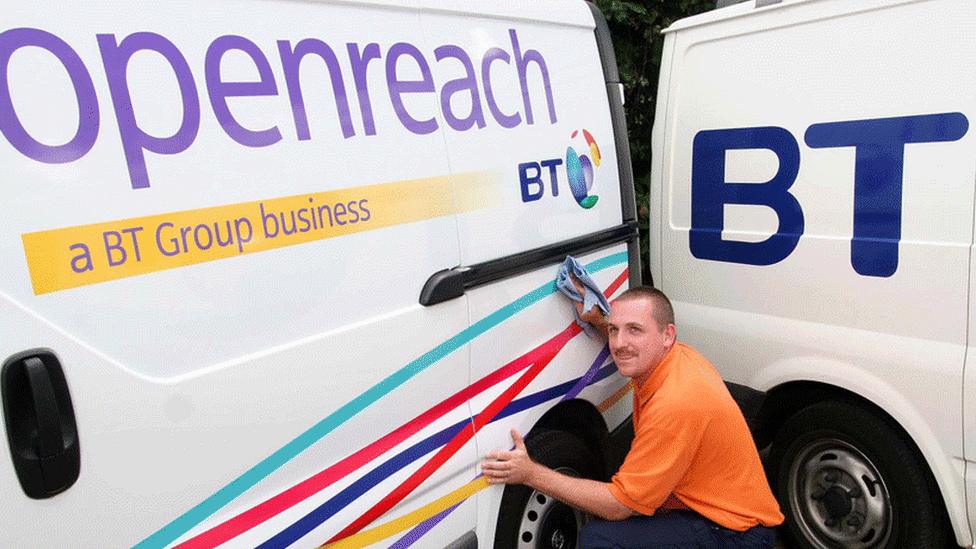Broadband - do we want it cheap or good?
- Published

Is Openreach investing enough in fast fibre?
The MPs on the Culture, Media and Sport committee are clear - our UK broadband strategy is going down the wrong path and BT must shoulder much of the blame.
The focus of their report is on BT's Openreach division and its alleged failure to invest in fast fibre. But there are others with questions to answer - notably the government, the regulator, and the broadband users.
Because if, as the report says, "the UK is not adequately investing in critical telecoms infrastructure", and is "a laggard by international standards in providing fibre connectivity", that cannot be entirely BT's fault.
The structure of our telecoms industry and the direction of our broadband strategy are, to a large extent, determined by the regulator Ofcom and by government ministers. Over the last decade, you could sum up their policy with those old retailers' maxims "pile it high, sell it cheap" or maybe "never mind the quality, feel the width".
In other words, they have determined - perhaps rightly - that we as consumers want to get hold of broadband as quickly as we can but pay as little as possible. The intensely competitive landscape here and Ofcom's pressure on prices are presumably why the UK scores well compared with other EU countries when it comes to geographic coverage, take-up and lower prices.

Ofcom is currently deciding whether to split Openreach from BT
Where we score badly is in providing the most expensive but future-proof connection, FTTP, fibre to the premises. BT is now beginning to ramp up investment in FTTP, as are rivals like TalkTalk and Sky, but the UK has a lot of catching up to do. Five years ago just about all the big players in the industry seemed convinced that nobody would want or pay for such a luxury service, so they were not going to waste money in a competitive environment. Perhaps the regulator should have been more focused on the long term, rather than promoting competition.
Competition was not the priority though in handing out the cash to reach rural Britain under the BDUK programme. Instead, it seemed to be speed and convenience that drove the decision to hand out all that money to BT. While the rollout has proceeded mostly on schedule, there are real concerns about a strategy which has seen the easier areas served first and information withheld from community schemes, making it difficult for them to know where to invest.
But the biggest failure in broadband strategy is surely what has happened to small businesses. They have been told by the government that fast broadband connections are vital to their future and to Britain's economic wellbeing. But "the present system is unacceptable", says the report, describing a situation where small businesses are given a choice of a ridiculously expensive leased line or waiting for months or years until BT decides to hook up their business park.

MPs have previously questioned why BT won all the rural broadband contracts
Yes, blame BT - but the MPs say it is being "perversely disincentivised" to put more effort into rolling out fibre to business parks, and that must be a failure of regulation.
There is also a revealing exchange between the committee and the former digital minister Ed Vaizey about a voucher scheme designed to help small firms get better broadband. The scheme had been such a hit that the funds soon ran out, and it was halted last year. The minister told the committee that he would like to revive it "but this was unlikely to be supported by the Treasury". Perhaps the new government's commitment to improving Britain's infrastructure will mean the new Digital Minister Matt Hancock has better luck with the Treasury.
The argument over whether BT should be split up will continue, probably for years. But in the meantime, we all need to decide what Britain's broadband infrastructure should look like - cheap and cheerful, or fast and future-proof.